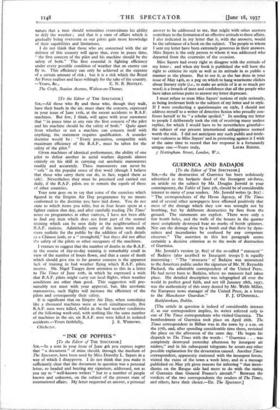GUERNICA AND BADAJOS
[To the Editor of THE SPECTATOR.]
SIR,—As the destruction of Guernica has been sedulously' advertised as the barbaric deed of the Insurgent air-force, an article on the subject by Mr. Douglas Jerrold in your contemporary, the Tablet of June 5th, should be of considerable interest to many of your readers. Mr. Jerrold writes (p. Sor) : " The correspondents of the Haves Agency, of The Times and of several other newspapers have affirmed positively that most of the damage which they saw was wrought not by bombing, but by deliberate destruction by fires from the ground. The statements are explicit. There were only a few bomb holes, and the walls of the houses in the quarter most completely destroyed bear no marks of bomb 'splinters. Nor can the damage done by a bomb and that done by dyne- miters and incendiaries be confused by any competent observer." The assertion in this last paragraph seems certainly a decisive criterion as to the mode of destruction of Guernica.
Mr. Jerrold's version (p. 13o2) of the so-called "massacre " of Badajos (also ascribed to Insurgent troops !) is equally interesting : " The ' massacre ' of Badajos was announced to the American public under the signature of Mr. N. Reynolds Packard, the admirable correspondent of the United Press. He had never beeri to Badajos, where no massacre had taken place. His detailed description was telegraphed all over the world in perfect good faith, and not till January 28th, 1937, was the authenticity of this story denied by Mr. Webb Miller, the European news manager of the United Press, in a letter to the Manchester Guardian." F. J. O'DONNELL. Rathfarnham, Dublin.
[The article in question is indeed of considerable interest if, as our correspondent implies, its writer referred only to one of The Times correspondents who visited Guernica. The bombardment of Guernica took place on April 26th. The Times correspondent in Bilbao was in the town by 2 a.m. on the 27th, and, after spending considerable time there, revisited the place on ,the afternoon of the same day. ' He began his dispatch to The Times with the words : " Guernica . . was completely destroyed yesterday afternoon • by insurgent air raiders," and in his subsequent telegrams he scouts any other possible explanation for the devastation caused. Another Times correspondent, apparently stationed with the insurgent forces, visited the ruins of the town a week later, and in a message published on May 5th gives reasons for inferring " that incen- diaries on the Basque side had more to do with the razing of Guernica than General Franco's aircraft." Between the verdicts of the two correspondents the readers of The Times, and others, have their choice.—En. The Spectator.]














































 Previous page
Previous page